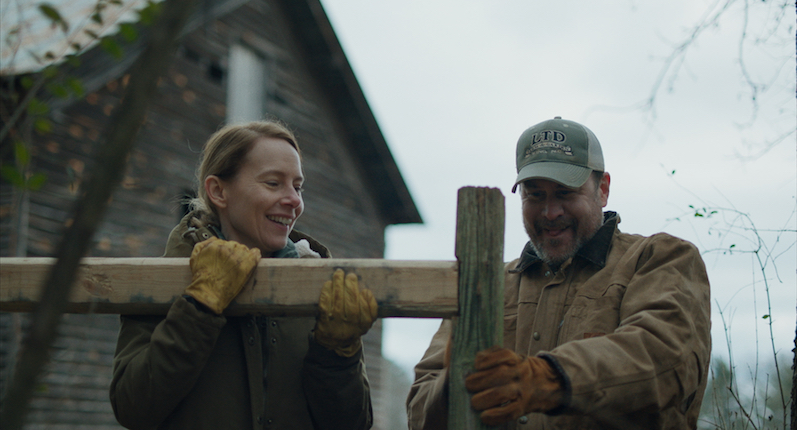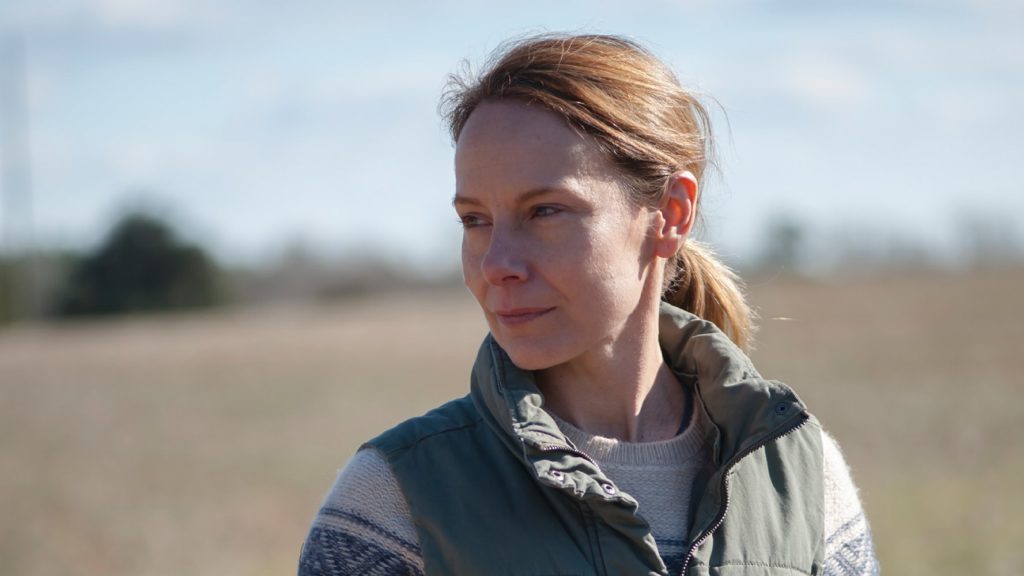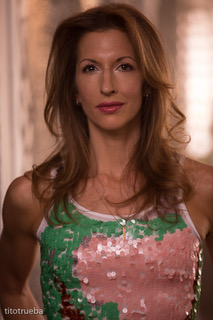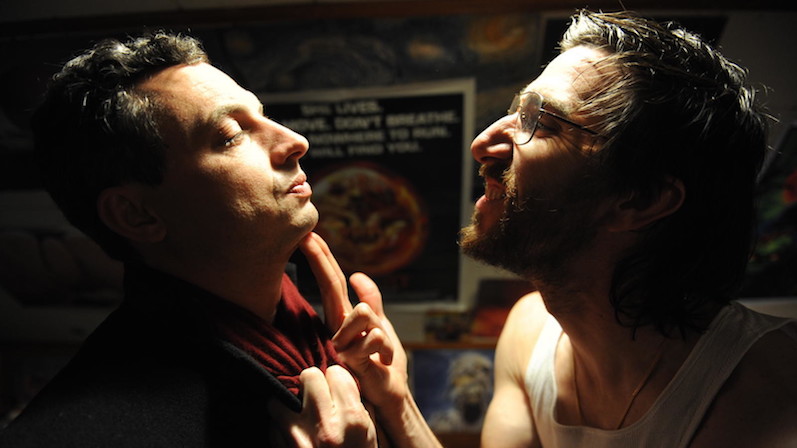One’s first awareness of actress AMY RYAN likely depends on their preferred form of scripted entertainment. Broadway fans would recognize her as a Tony-nominated stage veteran. Savvy TV viewers first got to know her on HBO’s now-classic series The Wire, or perhaps her memorable TV stints on The Office or In Treatment. And despite early appearances in award-winning indie films You Can Count on Me and Capote, most would consider Ryan’s breakout movie role to be the drug-addicted mother of a kidnapped girl in Gone Baby Gone. That earned Ryan a Best Supporting Actress Oscar nomination and jump-started her career as one of cinema’s most cherished character actresses, leading to roles in the films Before the Devil Knows You’re Dead, Changeling, Win Win, Birdman, and Bridge of Spies, just to name a few.
In the new drama film ABUNDANT ACREAGE AVAILABLE, Ryan has received rave reviews for her performance as Tracy Ledbetter, a tobacco farmer mourning the death of her father and faced with uncertainty about her family’s property and legacy. Shot on-location at a North Carolina farm, the indie feature is written and directed by Angus MacLachlan and Executive Produced by Martin Scorsese. After the film’s Tribeca Film Festival premiere, MacLachlan won the festival’s Best Screenplay Award for his “portrayal, both universal and intimate, of two families who meet, clash and ultimately discover what it means to call a place home.” Now Gravitas Ventures will release Abundant Acreage Available in theaters on September 29.
We were lucky enough to talk to the film’s leading lady, actress Amy Ryan, about her new movie and her varied career.
——
COLIN McCORMACK: From what I read, Abundant Acreage Available looks to be your first lead role in a film?
AMY RYAN: Yes, that’s true.
CM: That seems kind of insane to me.
AR: [Laughs]
CM: How did you get attached to the project?
AR: Angus MacLachlan had passed it to an agent at Gersh, who passed it to my agent at Gersh. I was very familiar with Angus’s earlier films, so I was very eager to read it, and that was that. It took a while for it to be made and at first, I had reservations just based on my own life and dealing with my own father’s illness and passing. So it wasn’t really a subject I was excited to go do. I was actually glad the film took a while to get going because a year later I was in a very different headspace and thought, I can go face this. This will be good. I just love Angus’s writing and it was nice to play a lead in a film.
CM: Aside from liking a script, are there other factors you think about or a strategy involved in choosing your projects?
AR: I can tell when I read a script when I first get it if I read it fast and can feel myself start to daydream about it after I’ve put it down, and I find myself, without even specifically searching… I’ll go walking down the street, Oh that’s like that person, and That’s like that character. So it gets in my wheelhouse in a way and it won’t let go. But the scripts that I have to put down and I get distracted and do a load of laundry in between, I know that’s going to kind of be the way I’m going to feel when I’m on set. I’m going to feel distracted and a little bored. So this is a script where you’re just sucked into the language and I feel like you can hear the sounds of the farm on the page and see the sky, so I wanted to go be in that world for a while.
CM: You’ve done your share of bigger-budget studio films. And with this, with just five actors, it’s so intimate. What draws you to still taking on something that’s maybe smaller budget or indie level?
AR: I think this type of film, they don’t come along very often. A lot of these films aren’t even made anymore, where it is character-driven. As you said, five actors and one set. So therefore it seems so new and un-done. It seems like such a fresh idea, a bold idea. The two main characters in the film are middle-aged siblings and they’re dealing with death. It’s not necessarily like a box office bonanza [laughs]. It’s such a small gem of a story that I really believe – if it’s able to find its audience – will speak volumes to people. I feel like we all as humans have gone through this or are facing it or will face it at some point in life. How do you move on with your life and get out of your routine and live your own life?
CM: As an actor, what’s the expectation when you walk onto the set of a lower-budget film? Are you hoping that they’ll actually have a dressing room for you or not expect you to hold the boom mic in between takes?
AR: Well, you know things like dressing rooms before you arrive. But especially with this [film], we shot in 17 days on a really minuscule budget. What I actually like when something is low-budget is that they really don’t have time to mess around. What you are hoping for is that the weather is on your side [laughs], because there’s no time to add days. You can’t, you just can’t. Maybe you can go inside the house and film something, but then the sound of the rain is on the roof. So we were quite lucky. We ended up having one snow day out of nowhere and we were able to rearrange, but other than that it’s this type of intimate film where the entire crew and cast will learn each other’s names instead of calling each other, “Hey Buddy.” And when no one’s looking, yeah, I did grab an apple box so we could hurry up because we were losing the light to clear the set [laughs]. I wanted to get that shot just as much as the DP wanted to get that shot. We worked on the farm and we had farmer hours: We started when the sun came up and we finished when the sun went down. So we had to be really efficient in how we worked, which is also kind of challenging when you have scenes with five people in it. It’s hard to cover all that. But everyone was on-point, and that’s what I love about smaller budgeted films. It can get done if it’s well thought-out.
CM: How was filming in North Carolina?
AR: We shot in East Bend, where the film takes place. It’s a town of like 600. That’s such an advantage to the actor’s process. You don’t have to use that part of your imagination to [think], We’re in Canada but I’m pretending I’m in the South in America. [Laughs] It’s like, no, this is it. And where we have lunch in the church who’s given us their basement for the crew and the cast to eat, these are the people, these are our neighbors, this is the real world. I mean, that is such an incredible, rich resource. And it was quite beautiful; the landscape there is very dramatic. The sounds and the color of the clay earth, it’s very much outside of what I see here in Brooklyn.
CM: Is it refreshing to get out of the production boom cities like LA or New York or even Atlanta, and film somewhere new?
AR: I mean, personally I’d rather film every film in Brooklyn so I can come home and see my family [laughs]. But if I have to leave and go somewhere else, I much prefer to go to a location in which it really enhances the story and not just because it’s cheaper to film there.
CM: With such a tight schedule, did you have time to explore the farm and try to get to know the location before filming actually began?
AR: We did. Right before we started filming, Angus took the cast out to the farm. He had shown pictures to me and took little movies of it before we got down there, so it felt very familiar. But it’s stuff like walking on that clay earth and hearing the corn stalks crunch. He actually screened the film in Winston-Salem last week and this man who was in the audience said, “That was my grandfather’s house.”
CM: Wow.
AR: He was just crying. He said, “Thank you so much for portraying us so accurately and not making fun of this part of the world.” I think that’s what’s so rich in Angus’s work is he’s able to portray people, their quirks, and warts and all, without making fun, and really bringing these worlds to people who may not otherwise get the chance to meet characters like this.

CM: In your career, you’ve worked with first-time filmmakers and veterans like Sidney Lumet and Steven Spielberg. Martin Scorsese is an Executive Producer on this film. Is there anything specific you’ve learned from either the newer filmmakers you’ve worked with or those filmmaking legends?
AR: Sidney was a huge influence on me, and [I was] able to work with him a few times on different projects. For Sidney, it was imperative that you come prepared. He filmed famously fast and it was, I’m not giving you a take to learn your lines. You must come with your lines learned and ready to go. He said, Because fourth and fifth takes aren’t as interesting. We should all go home to our families. You’re not going to do anything so dramatically different if you’re prepared. So be prepared. I take that with me. It’s also something I learned just by starting in the theater. I also just try to be open to every director. I don’t want to come with my own set of rules like, This is the way I work! You’re there to collaborate. That’s my idea, to bring the story to life together. So I stay open but I am prepared.
CM: You’ve also worked with some actor-directors – Ben Affleck, Philip Seymour Hoffman, Tom McCarthy – Is there a different relationship that you develop with a director who also has extensive acting experience?
AR: It is different because there’s certainly perhaps more compassion; they know what it’s like to be in the hot seat or if a scene’s not working. They know what that feels like. They know how you have to think fast on your feet to get out of that rut. I feel like they have more of the quick language that actors use that’s going to expedite that process. Sometimes other directors might say, “Do it again.” And you’re walking away wondering, Faster? Less big? What does that mean? [Laughs] But certainly, I do find that the actor-directors just have that language. They’ve been there.
CM: Is directing ever something that you’ve considered?
AR: No! No, hell no! No. [Laughs] To thine own self be true. It’s not in my talents. I can see the arc of the character I’m playing, I know how to shape that and drive that. But I can’t see the entire piece in an arc and how to drive all the elements of the story. I can see it when someone tells me what the answer is and I go, “Yes, that makes sense.” [Laughs] “No wonder you’re filming this as a big wide shot.” But no, I don’t have that in my bag of tricks.
CM: In the 2009 film The Missing Person, you were an Executive Producer. Is producing something you are interested in or was that specific to that project?
AR: The reason I have that credit there is I was helping the director at the time find the male lead. And you know, trying to finance small films, he was looking for a name. I said to him, “Trust me. Hire Michael Shannon. By the time this film comes out he will be a name.” And sure enough, when it premiered at Sundance, Michael Shannon is nominated for an Oscar. So I was really just trying to be supportive and also trying to get friends jobs, basically [laughs].
CM: Yeah, you’ve worked with Michael Shannon more than once, right?
AR: Yeah, three times. Missing Person, and then we did a film of our mutual friend Síofra Campbell‘s, it’s called Marvelous, with Ewen Bremner. And then we were both in Sidney Lumet’s Before the Devil Knows You’re Dead, but we didn’t have scenes together. But those were the three projects we worked on together.
CM: After you earned so much acclaim for Gone Baby Gone and you were painted somewhat as an “overnight sensation,” was there that feeling of suddenly certain doors being opened or movie roles being offered that hadn’t been before?
AR: Oh yeah, it was a whole new world. Hands down, that’s the game-changer. Because of Ben Affleck, I’m talking to you. Because of Ben Affleck, I’m playing the lead in Abundant Acreage. From that moment on, everything took a sharp turn. And you still have the same challenges and problems that you had beforehand, but maybe I don’t have to audition; maybe I don’t get a script just the night before and have to get myself to Midtown and put myself on tape, which is a great luxury. But I’m still trying to keep it interesting and not repeat myself. Make health insurance [laughs], it’s all the same. Same problems, higher stakes.
CM: There’s the real-world things you think about, like insurance, and the headier things like the character and the craft.
AR: Yeah.
CM: But you’ve also played so many different types of characters in seemingly every genre. Is there something you can think of that you haven’t tackled yet that you are interested in?
AR: I think it’s about time I put on a corset. [Laughs] I mean, not that I really want to sit on set all day in a corset. I haven’t really done – other than 1950s America – I haven’t really done a period piece, and that could be fun. Yeah, there’s still a lot out there left to do.
CM: On the other side, is there a type of role you’re tired of playing or a character trait that when you read the script it’s an immediate, Ugh, no thank you?
AR: The biggest challenge for women and women my age is, Oh my God I’m the wife, I’m the ex-wife, I’m the girlfriend. That’s the stuff you want to break away from. Even if it’s not the lead character, I don’t really want to leave my home life and go play someone else’s mom all the time. I’d rather go home and be the real mom to my real daughter. So it’s just finding interesting stories, and if they happen to be a mom, let it be an interesting world and something we haven’t seen, someone that’s not just reasonable and the sounding board and such. That’s what I try to find, something different in that world.
CM: There’s a lot of talk and people writing about women in film and roles for women and portrayals of female characters – have you noticed a difference in scripts you’re seeing of more females at the center, more complicated characters coming across your desk?
AR: You know, I see it on TV for sure. I think that’s a really strong place for women. And female-driven films always seem to score really well at the box office, but it’s still a long way to go to make that the norm. I don’t mean to take away from the films we have now, but add it to the mix. There’s certainly room for improvement, but I think you can see it in cable TV as well.
CM: It does seem to be one of those things that takes people by surprise every single time a female-centered film does well. They’re like, “Wow! Who knew?!”
AR: I know! And for years and I was always so envious of in England, “I’d love to do just a six-part series. Why can’t we do that here? Why do we have to sign on for seven years or more? I don’t want to play any character for seven years!” [Laughs] And I am really excited that that has taken off here. Six-part miniseries, get in and get out. Tell a complex story that’s rich without “jumping the shark,” as you say. So I love that that part of the game has changed.
CM: Do you have projects lined up either on the film or TV side that you are particularly excited about?
AR: I have two films that will come out sometime next year, both that I’m really excited about. One is Beautiful Boy with Steve Carrell, and the other one is a thriller called Strange But True. And then the others I’m just figuring out, Do I want to do a play? Do I want to do a film? So I’m just weighing that out now, but nothing that I’ve committed to.
CM: Abundant Acreage Available is rolling out this week. Are you doing any travel to promote it or sticking to New York?
AR: Just here in New York.
CM: Well, I really enjoyed the film, it was really moving. And you’re great in it, obviously, but you’re always great if I can kiss ass a little bit.
AR: [Laughs] This is a great way to start my day. Acting can be a hard life, but when it’s good, you know, what other professions get applause and told they’re great? It’s not fair, you don’t go to schools around America and give applause to teachers or nurses. I was on Amtrak and this very charming, older conductor was taking tickets and he said, “Oh, why are you going to Boston?” And I go, “Well, I’m an actor. I’m going to be in a film there.” He said, “Ah! The two most noble professions I know of…” And my eyes widened and I started to blush, and he goes, “Teachers and nurses.” [Laughs] I was just like, “I couldn’t agree with you more.” They don’t really get the accolades that actors do.
CM: They don’t have televised awards ceremonies for teachers.
AR: But we’ll play them. We’ll play them on TV and live through them.
__
Thanks to Amy for taking the time to talk with us about ABUNDANT ACREAGE AVAILABLE. Follow the film on Facebook.
If you’re an independent filmmaker or know of an independent film-related topic we should write about, email blogadmin@sagindie.org for consideration.





